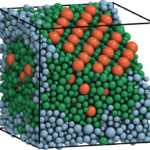HPC User Report from M. Klement (Institute for Multiscale Simulation)
Crystallization Processes of Colloidal Particles
Crystallization processes are ubiquitous in nature. They also occur in colloidal suspensions during solvent drying. Our advanced particle simulations predict crystal structures and assist in understanding driving mechanisms of experiments in simple and complex systems of colloids.
Motivation and problem definition
We come across a variety of colloids in our daily lives, for example milk, blood, and paints. These materials are colloidal suspensions, which means they are made up of colloidal particles with diameter 10nm to 10μm that are freely movable in water. Besides their practical occurrence, colloids are complex materials with emergent properties (e.g. optimized porosity or structural color) and can serve as model systems to understand phase behavior. Despite a long history, simulations of colloids are typically limited to bulk systems or to monodisperse systems where all particles are of identical size. This project improves algorithms to simulate colloids and advances these simulations towards more complex systems. To be specific, we study multi-component mixtures and investigate the effect of confinement that occurs when colloidal particles are dried in emulsion droplets. Our simulations are performed in close collaboration with experimentalists at FAU that guide our work and reproduce our predictions.
Methods and codes
Our colloidal particles interact via short-range, mostly repulsive interactions. This means we can model them to good accuracy as hard spheres. Event-driven molecular dynamic simulations, Monte Carlo, and hybrid (Newtonian) event-chain simulations are used to simulate particles accurately and efficiently. For this purpose, we reimplemented existing algorithms and developed new algorithms. We also used particle swaps and advanced sampling methods for acceleration.
Results

Outreach
- M. Klement, M. Engel, Efficient equilibration of hard spheres with Newtonian event chains, J. Chem. Phys. 150, 174108 (2019)
- J. Wang, C.F. Mbah, T. Przybilla, B.A. Zubiri, E. Spiecker, M. Engel, N. Vogel: Magic number colloidal clusters as minimum free energy structures, Nature Comm. 9, 5259 (2018)
- J. Wang, C.F. Mbah, T. Przybilla, S. Englisch, E. Spiecker, M. Engel, N. Vogel: Free energy landscape of colloidal clusters in spherical confinement, ACS Nano 13, 9005 (2019)
- P.K. Bommineni, N.R. Varela-Rosales, M. Klement, M. Engel: Complex Crystals from Size-Disperse Spheres, Phys. Rev. Lett. 122, 128005 (2019)
- 5. P. K. Bommineni, M. Klement, M. Engel: Growing binary hard sphere crystals, arXiv:1912.06251 (2019)
Researcher’s Bio and Affiliation
Marco Klement studied Physics in Bayreuth. He is a PhD student at FAU since May 2017 working with polyhedral particles, in particular improving the way they are simulated. Dr. Praveen Bommineni received his PhD in Chemical Engineering from the Indian Institute of Science Bangalore, India in 2018 before joining FAU to work on structure formation in colloidal systems. In 2020 he joined the Department of Chemical Engineering at the National Institute of Technology Warangal, India as Assistant Professor. Chrameh Fru Mbah studied Applied Mathematics at KTH Royal Institute of Technology, Sweden. He joined FAU as a PhD student in February 2017 and works on colloidal crystallization in spherical confinement. This work was performed in the group of Prof. Michael Engel at the Institute for Multiscale Simulation in the Department of Chemical and Biological Engineering.
